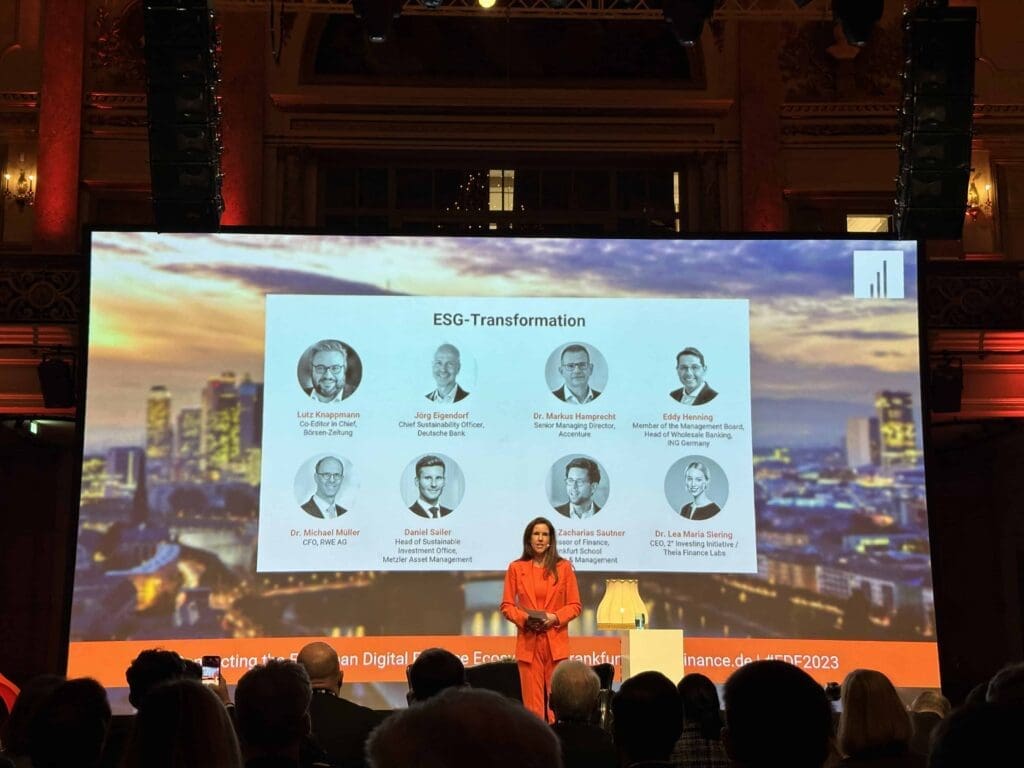The Frankfurt Digital Finance (FDF) conference has come and gone. It was an amazing event and an eye-opener. Coming from Poland, the conference shed light on trends that are becoming more important in Western Europe. With the financial landscape set to change, here are three trends that you should know.
Reducing your environmental impact can help secure finance
Held in the botanical gardens, the conference building itself provided a stunning backdrop to the morning’s first talks. Detailing how ESG financing is changing the way companies secure capital. Environmental, Social, and Governance financing (ESG) ties together, both the financial performance of a company and its environmental impact.
The first main panel of the day discussed a major shift in regulations. The EU has already imposed rules regarding the moral responsibilities of companies. More financial bodies are using these figures as a way of measuring risk. In Europe, regulations will force around 50,000 companies to adhere to the new standards. Many companies are working to improve their ESG practices because they feel a sense of responsibility. Banks are starting to only lend to companies that measure and improve these ESG areas, as they believe it is less risky in the long term.
A changing Europe
With the regulations set to be in full force by 2023, it’s something that needs to be acted on now. You risk being left behind if you are not on the wagon. A recent report highlights the increasing global interest in environmental and social issues and the importance of ESG reporting for businesses.
It states that 85% of investment managers are adding ESG criteria into investment decisions. And that 76% of institutional investors and 81% of private investors in Germany show interest in ESG investments. The volume of ESG-linked loans to companies in Europe has more than quadrupled from 2017 to 2019. Reducing your carbon footprint, including in software, is a must if you want to be certain of securing finances.

One way of working towards the new policy is to optimize your infrastructure. There’s a big opportunity in the market for companies that can help reach these standards. Recently we have worked closely with a company to do just this. Reducing their server count from 64 down to 2. You can read more about the project here.




Banks are not immune to new financial trends
As the day progressed the talks separated into smaller sessions. It was a big surprise to me that the rooms meant for the smaller panels were filled to capacity, and a lot of people had to stand. That only confirmed that the presenters were very well chosen and had interesting advice to share. One of these smaller panels detailed how financial institutions are using blockchain to change the face of banking.
Blockchain technology is changing the way transactions are made and has become an important trend in banking. Blockchain reduces the risk of fraud and enables real-time transactions. This not only reduces costs for banks, but it also provides greater transparency and security for customers. Also, the use of blockchain in banking can help to mitigate financial risks. Improve regulatory compliance and support new financial products and services. As the world of finance becomes more digital, the importance of blockchain technology in the banking industry will only continue to grow.
Investors are coming to Europe
One of the afternoon sessions that caught my eye, detailed The Future of Funding for European FinTech. With a range of issues affecting the markets it was good news to hear about the positive position Europe is in. The financial trend of investors moving to the more stable European market is cause for hope.
In recent times, market conditions have been negative, leading to a decline in the performance of startups and the market in general. Yet, the situation in Europe is much more stable compared to other regions. And there are indications that it will continue to improve in the coming months. This situation has attracted investors from the United States to Europe in search of better opportunities. In Europe, startups are relatively cheap compared to other regions, which provides investors with a more affordable entry point into the market. Despite the challenges faced by the market, the stability of the European market and the lower costs, make it an attractive destination for investors.
Evaluating my time at the conference
The Frankfurt Digital Finance Conference highlighted several emerging trends in finance that are set to shape the future. The shift towards ESG financing is changing the way companies secure capital and is becoming a major consideration for financial institutions. Blockchain technology is transforming the banking industry by providing secure and efficient transactions and reducing the risk of fraud. Additionally, investors are moving towards the more stable European market in search of better opportunities, making it an attractive destination for investment. These trends prove the need for companies and individuals to stay informed and adapt to the changing landscape of finance.





